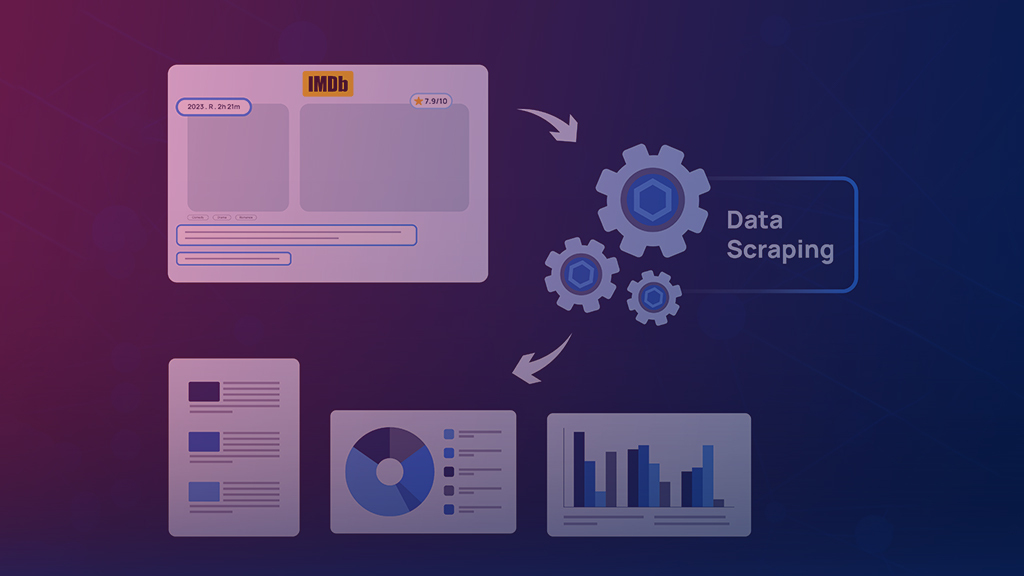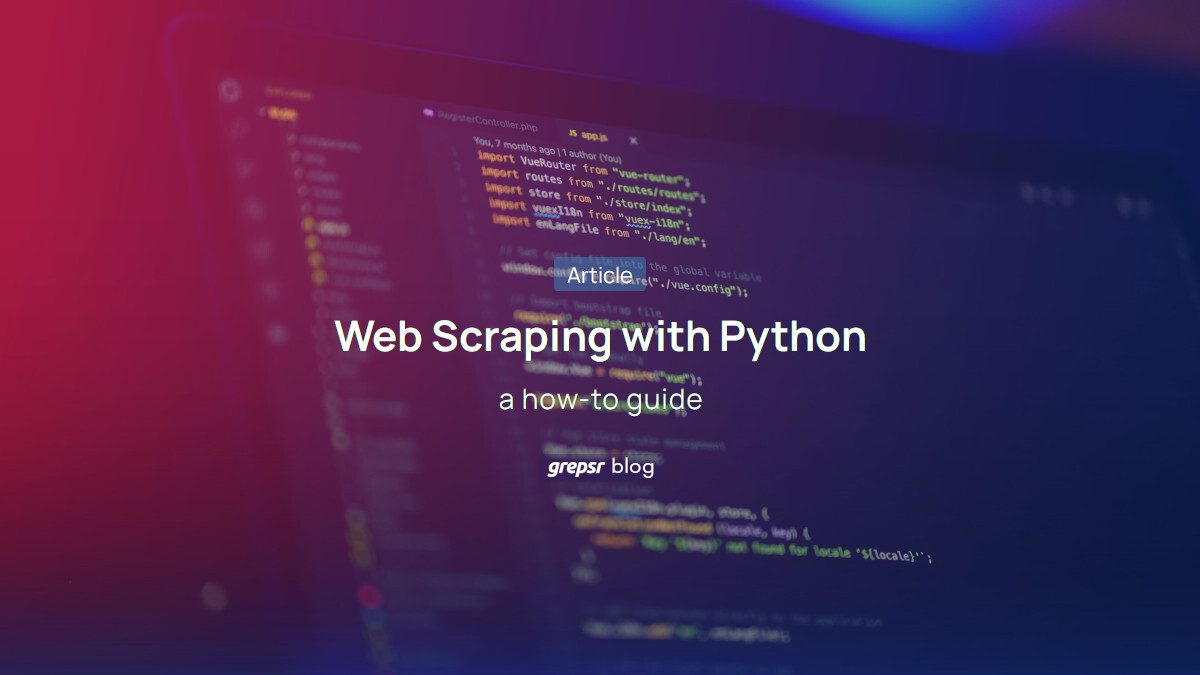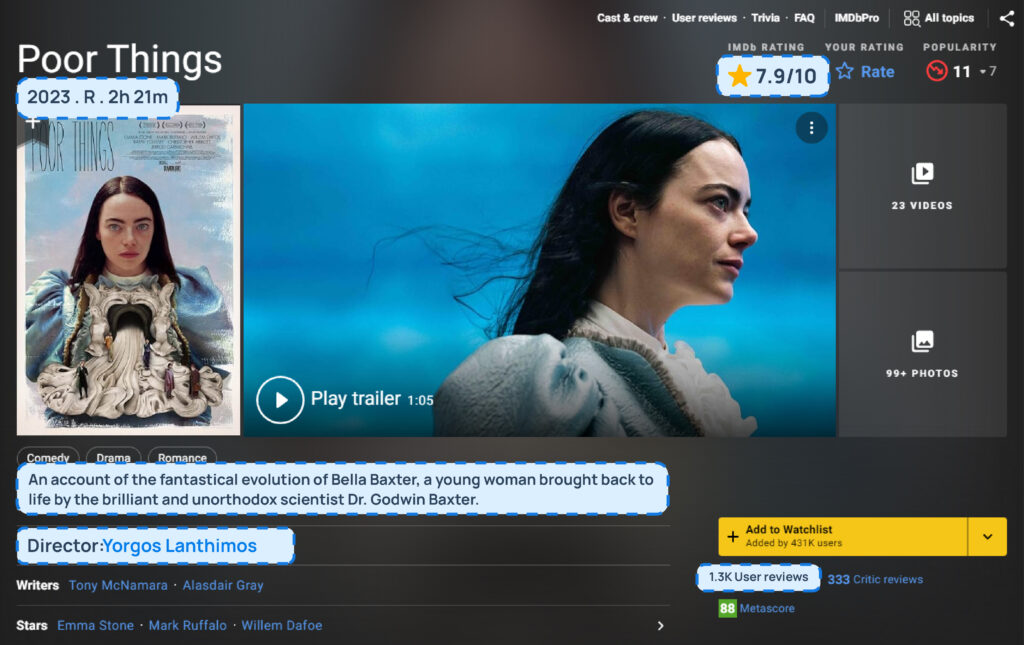
What if you could predict the next sleeper hit, build your own personalized recommendation engine, and forecast trending travel destinations?
This isn’t science fiction. This is the power of IMDb data scraping.
IMDb is perhaps the most authoritative voice in movie and TV content for good reason — with 200+ million unique monthly visitors and over 500 million data items, the platform is a weatherglass for public opinion.
The best part about the website is that it’s built for users, by its superusers; people like Joe Wawrzyniak from New Jersey who is credited with writing 3,000 biographies. It’s a golden goose hiding in plain sight for those looking to forecast trends, predict box office success, and optimize marketing strategies.
So, whether you’re a film production company, entertainment news outlet, media streaming platform, travel agency, or simply a data enthusiast like the lot of us, stick around.
You’re going to like where this is going.
TL;DR: Who Benefits from IMDb Data Scraping?
If you’re wondering, ‘Sure, IMDb has a lot of data, but what can I do with it?’ — here’s your answer.
| Type of Business: | Benefit(s) of IMDb Data Scraping: |
| 1. Film Production Companies and Studios | -Make predictions about the success and profitability of your movies -Analyze actor popularity and past performance to make data-driven casting decisions |
| 2. Entertainment News Outlets/Writers | -Explore actor/director career paths and genre popularity -Examine box office trends and audience sentiment |
| 3. Media Streaming Platforms | -Enhance content discovery and recommendation systems -Provide a better user experience and increase subscriber retention |
| 4. Websites and Apps for Movie/TV Enthusiasts | -Keep users up-to-date with accurate movie information -Build a personalized recommendation engine for movies |
| 5. E-Commerce Stores (specializing in DVDs, Blu-Rays, and movie-related merchandise) | -Optimize inventory based on audience demand and movie popularity -Develop targeted marketing campaigns based on genre and actor preferences |
| 6. Advertising and Marketing Agencies | -Provide entertainment clients with data-driven strategies -Analyze the movie preferences and demographics of your target audience |
| 7. Travel Agencies | -Identify popular movie locations to capitalize on film tourism trends -Join forces with hotels and tourist attractions featured in popular films and TV shows |
PRO TIP: If you’re an academic researcher in the fields of film, journalism, or data science, IMDb data scraping could be the ticket to your next published paper!
Now, onto the burning question…

How Do I Web Scrape IMDb?
We’re glad you asked.
In the guide below, we’ve detailed a walkthrough of extracting IMDb’s top 250 movies of all time:

The success of your web scraping strategy relies heavily on the service you choose. The service should optimize your time and provide actionable insights from raw, unstructured data. Luckily, we’re experts in data extraction.
Grepsr guarantees clean, high-quality data management for your business at scale.
The Power of IMDb Data Scraping
Personalizing the User Experience
Let’s say you’re a streaming platform executive. You’ve been tasked with building a personalized movie recommendation engine to keep your subscribers glued to their screens.
You may have a massive content library with millions of titles. But that’s not enough anymore. The winning ticket is to refine content discovery for two simultaneous goals: shorten the evaluation time for audiences, and take a proactive stance in shaping public perception.
As of today, Netflix leads the pack with its powerful recommendation system that has 260 million paying members. They’re so good at this that 80% of their viewer activity comes from personalized content.
But HBO Max, Peacock, Disney+, and Amazon Prime have been able to dent its perfect growth trajectory.
How? And can you do the same?
The answer begins and ends with Big Data.
With IMDb data scraping, you get scores of data items directly indicative of your potential customers’ watchlists, reviews, and ratings.

When you have big datasets and a team of data extraction experts on your side, you can discern patterns, preferences, and popularity in entertainment much ahead of the curve. (Read: this is how you beat your competition.)
Which David Fincher movies are popular with The White Lotus fans? How’s the 4th season of True Detective faring in comparison to its predecessors? What else do fans of Breaking Bad regularly watch?
This is proactive analytics — combining the strength of historical and real-time data to create hyper-personalized customer experiences where you can not only identify but anticipate audience preferences.
IMDb Data Scraping: Oppenheimer and New Mexico
The popularity of TV shows or movies on IMDb has a direct correlation with the tourism industry. No, really.
Film tourism, also called ‘film-induced tourism,’ ‘screen tourism,’ or ‘set-jetting,’ has a rather surprising market share of almost $70 million. (Who would’ve thought, right?)
But it makes sense — we become so immersed in the fantastical and oftentimes real worlds of movies and shows, that we long to experience a deeper emotional connection with the characters. There’s a reason people’s itineraries to England are dotted with Harry Potter studio tours.
What does this mean for your travel business?
Consider just last year, the furore surrounding Nolan’s Oppenheimer. (And the thousands of Barbenheimer memes.) As the movie broke even IMDb records, fans flocked to New Mexico to relive the physicist’s love affair with the desert.
Los Alamos County says the Manhattan Project National Historical Park — and its sites like the Oppenheimer House — drew 110% more visitors in July 2023 than it did in all of 2022.
It skyrocketed in the first month after the movie…things went way the heck up. Businesses have seen a significant uptick.
Leslie Bucklin, Los Alamos County Public Information
Imagine the success of an Oppenheimer-themed travel itinerary to New Mexico in August last year.
It’s all about context.
Therefore, at the intersection of film and travel, IMDb data scraping can serve as your magnifying glass — picking up winds of success, trailing patterns, and allowing you to tailor your marketing strategies in line with trending cultural phenomena.
Predicting Box Office Success with IMDb Data
What if you knew the movie or show you’re making would be a hit even before you greenlighted the script?
- A study published in MIT Libraries has proven this isn’t a sci-fi fantasy — it’s possible to predict box office success by scraping IMDb data.
The researchers analyzed IMDb data to identify patterns and correlations affecting box office success by studying movie interconnectedness, director’s credentials, and innovative indices to predict financial success.
Here’s what they found:
A movie with strong ties to another successful film or franchise is more likely to do well at the box office. This is the “franchise effect” — think Jurassic Park, Avatar, or Fast and Furious. Furthermore, the box office performance of a director is heavily influenced by the reputation and track record of the director. Think, Oppenheimer.
- In a 2022 study by Carnegie Mellon University, analysts collected a dataset of 6,820 different movies from 1986 to 2016. They discovered that IMDb median ratings for winter releases were the highest at 6.4. However, summer is the biggest box office season accounting for an average of 39.6% in yearly revenue.
Takeaways:
- IMDb data scraping powers proactive analytics to mitigate financial risks for film production companies and studios by forecasting robust movie investments.
- If you know the markers of box office success, you’re better positioned to make data-driven decisions when it comes to release dates, casting, marketing, and resource allocation.
- IMDb data scraping is a window into consumer sentiment — what does your audience like to watch? Would they watch something similar? Why did they like your production? This is an excellent method to poke into a movie industry analysis of what sells and what falls flat.
Follow the IMDb Data Trail
IMDb is a pot of gold at the end of the rainbow for everything movies and TV. The winners in the entertainment industry will be those who can collect, analyze, and operationalize large amounts of data at scale.
For movie studios and streaming giants, the war rooms of the future will be stocked with data scientists, not just screenwriters.
The question is, will you read the tea leaves before your competition does?
We’re here to help you turn raw audience sentiment into revenue-generating business intelligence. Are you ready?




















